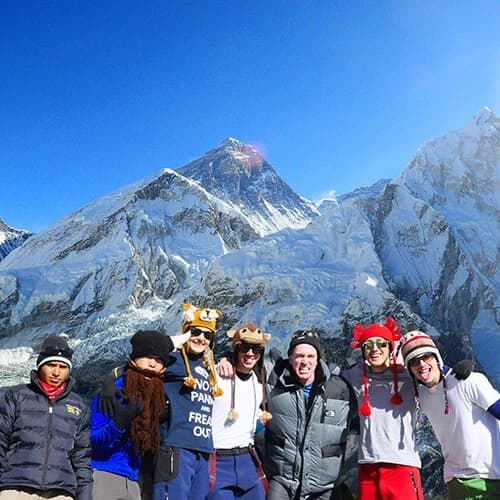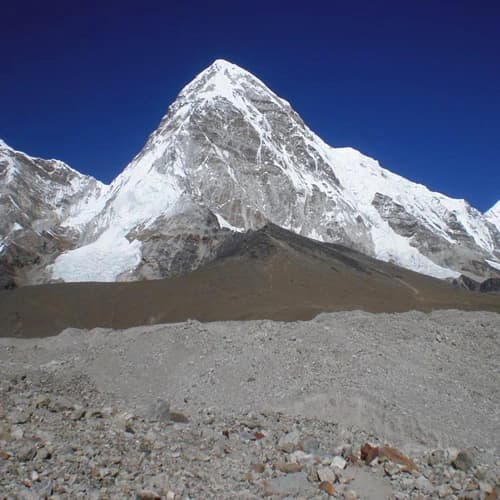What makes Everest Base Camp a beginner-friendly trek?
The Everest Base Camp is considered a moderately difficult trail among hundreds of trekking trails, ranging from very easy to extremely difficult. The difficulty level differs on various factors such as the trek altitude, remoteness of trail location, steepness of the trail, facilities available in the route, weather and temperature of the region, time of the trek, physical and mental fitness of the trekker, and so on. Considering all these factors, the EBC trek is of moderate difficulty making it doable for beginners. First-timers, however, might find the trek difficult due to their lack of experience.
Although there's no road connection to reach the trailhead of the EBC, regular flights are available from Kathmandu or Ramechhap to Lukla. This lets you skip a long bus ride in the off-roads of rural Nepal. Likewise, the accommodation and food facility in the Everest region is so well established that you might forget you're in the Himalayas. In addition to basic tea houses and mountain lodges, you'll see some high-end hotels in towns like Lukla and Namche Bazaar comparable to 4 or 5-star hotels. Everest View Hotel is a great example of this. You'll find decent restaurants and tea shops serving delicious local and international cuisines along the entire route, with nice bars and cafes in Namche. These facilities make it easier for beginners to easily adapt to the Himalayan environment and relieve the stress of carrying tents and food for the journey, making Everest Base Camp an ideal trekking destination for first-time trekkers.
10 tips for first-time trekkers to trek to EBC
Planning your first trek can be overwhelming. Executing it can be even more challenging. And, when it's in a new country, that too, in a remote Himalayan region that's far away from the modernization of cities, it can get way more uncomfortable. But great things lie beyond your comfort zone! In this case, it's literally great, the Everest. So, to ease it up for you, we've listed some tips. Please go through them before you book your Everest Base Camp adventure.
Take some time for preparation
A good preparation is half the work done. Since you don't have high-altitude trekking experience, you don't exactly know how much effort it takes to push yourself uphill time and again in a single day. You'll be gaining an altitude of good 500m to 800m every day. So, it requires some training. When we say training, we don't mean proper mountaineering training. You won't be climbing any mountains; you'll just be hiking in the high mountainous region.
Your preparation may include some cardio exercises like running, dancing, swimming, HITT workouts, etc. Do what works best for your body and what fits your lifestyle. If you don't have the habit of working out, start preparing at least 6 months before the trek. You can also add weight training if you go to the gym. Take stairs instead of elevators or escalators whenever you can. Furthermore, go for multiple-day hikes with a rucksack at least twice before heading to Everest Base Camp.
Choose a reliable trekking company
Booking your trek through a reliable trekking company greatly affects how efficiently you complete the trek. There're hundreds of trekking companies offering their services in the Everest region. Some are local, and some are international; some are old, and some are new; some are genuine, and some turn out to be a scam. So, choose the trekking company wisely.
We suggest you go for a local company that has at least 10 years of experience working in the Everest region. More years means they've worked through diverse weather and climatic conditions and served various trekkers throughout those years. They can satisfy your needs and rescue you when things get wild in the Himalayas. To check the company's authenticity, go to their websites and social media, check their reviews on TripAdvisor, and contact them via mail, text, or call, before booking with them.
Book the trek during an appropriate season
There're two main seasons to trek to EBC, spring (March to May) and autumn (September to November), and two off-seasons, monsoon/summer (June to August) and winter (December to February). Spring and autumn are peak seasons for reasons like stable weather conditions, moderate temperatures, and clear skies resulting in uninterrupted Kathmandu to Lukla flights and even clearer mountain views. So, trekking during the peak season is the best for beginners.
While people do trek during the off-seasons despite heavy rainfall, snowfall, brisk wind, cold temperature, and unclear views, it isn't just ideal for first-time trekkers. One advantage of trekking during the off-season is less crowd. So, it's a choice you have to make, whether you want ideal trekking circumstances or empty trails.
Get travel insurance
Having travel insurance is a must not only for beginners but for all trekkers trekking in the Nepalese Himalayas. As cool as it sounds, trekking to the Everest region is just as much a risky task. Even after weeks of planning and months of preparation, things might go wrong at any time during the trek. So, you must be prepared for the worst.
Acute Mountain Sickness (AMS), commonly known as altitude sickness, is the most common risk while trekking in high altitudes above 3000 meters. While mild symptoms are manageable, severe symptoms need to be addressed immediately. As there are no hospitals in the Everest region, you might have to be airlifted to Kathmandu for treatment. Similarly, in case of weather emergencies and natural disasters, evacuations are carried out using helicopters, which are expensive. So, if you have travel insurance covering such expenses, you don't have to worry about finances during a time of crisis.
Carry the right trekking gear
Trekking gear is your best friend during the trek. So, make sure they're the best. As Namche bazaar is the last place you can purchase any trekking equipment, and it's expensive there, ensure you have everything you need before leaving Kathmandu. Even if you've forgotten anything, you can double-check them in Kathmandu and purchase anything that's left behind. Thamel in Kathmandu has everything you need for your trek.
Here's a rough idea of what items you need to pack for your trek. Compare it with your own list and get everything that's necessary.
- Hiking shoes (wear them out before the trek to avoid blisters)
- Sandals/Crocs (for when you're not hiking)
- Several sets of underwear
- Down jacket and pants
- Woolen jacket and trousers
- Thermal suit
- Trekking Pants and T-shirts
- Trekking poles
- A set of gloves
- A wool hat
- Sunhat
- Sunglasses
- Sunscreen
- A water bottle and purifying tablets
- Toiletries
- A towel
- Nutrient bars, chocolates
- Basic medications
- Raingear
Pack light
The most common mistake first-time trekkers make is, packing heavy. While such a mistake does not cost you much during other vacations because you can leave your stuff in your hotel room and roam around freely, packing heavy will make your trek so much more difficult as you have to carry all the stuff with you throughout the journey. Even if you hire a potter, a potter will only carry a maximum of 12 kg from each trekker. Moreover, the Lukla flight will only allow 15 kg of luggage per passenger. So, pack only what's absolutely necessary. If you're hiring a guide, make sure to carry a smaller day pack where you carry the essentials you need during the hike, like water bottles, sunglasses, sun creams, cash, etc.
Hire guides and potters
If you were a novice trekker who's habituated to trekking scenarios in high attitudes like the Everest Base Camp, we wouldn't stress much on guides and potters. But, for beginners, trekking guides and potters are very important. Remember, a good guide can make or break your trek. An experienced guide will not only navigate you along the trail but also educate you about the mountains, flora, and fauna of the region. Moreover, they'll also act as an interpreter between you and the locals if you want to communicate with them. They're also well-trained to respond appropriately to emergency situations and ensure your safety.
While trekking guides ensure your safety, potters make your trek much more enjoyable as you don't have to drag your heavy backpack up and down the hills. So, make sure to hire guides and potters for your first trek, which will also help the local economy.
Go slow with adequate acclimatization and proper rest
We understand your excitement. It's your first trek, and you want to cover as much distance as possible to get to your destination quickly. While this might work for short treks, it turns out to be a disaster in a long trek like EBC. You might feel okay for the first few days, but the excessive load on your body starts to show up as exhaustion after a few days, and you might get sick. Furthermore, you're getting to a higher altitude every passing hour, so going fast increases your risk for altitude sickness, further worsening your health condition. Chances might occur that you might have to end the trek.
So, to make the most out of your first trek, go as slow as possible, sleep well to recover your body overnight, and take frequent acclimatization days so that your body gradually adapts to the decreasing oxygen level.
Take extra care of your health
As discussed earlier, there's a great risk of altitude sickness during high-altitude trekking. Symptoms include headache, nausea, vomiting, loss of appetite, difficulty sleeping, increased heartbeat, etc. To prevent AMS, make sure to eat well, sleep enough and hydrate your body by drinking 3-4 liters of water every day and staying away from dehydrating agents like alcohol.
Injuries are another significant risk while trekking. Even a minor injury may need you to stop the trek as there's no proper healthcare facility in the Himalayas. So, take extra care while hiking to avoid any injuries, even blisters. Drink either boiled water or purified water to prevent any water-borne diseases like diarrhea. Make sure to carry a first-aid kit with all the regular medications, and consult your doctor before the trek if you have any health conditions.
Keep a positive attitude
Last but not least, don't forget to keep a positive mindset. Your mentality about things around you directly or indirectly impacts the quality of your trekking journey. For instance, while trekking in the rural Himalayan areas, you might come across traditions that do not make sense to you, but instead of criticizing the local's beliefs, it's best to keep an open mind and move along.
Similarly, due to the remote location, you might not be able to use the internet everywhere you go, or there might be a power outage due to low sunlight. Instead of whining about it, look around and appreciate the nature that you came for. As it's cold at a higher altitude, the water is mostly frozen, and you need to pay a few dollars for a warm bucket of water, which isn't enough for a proper bath. So, prepare not to take a shower for days to come. Carrying a deodorant would help to some extent.
Interact with the locals and fellow travelers and share countless travel stories with bonfires in the tea houses. It's small things like these that keep a lasting impression, so appreciate these little moments.
As we've come to the end of the blog, we hope you've now found enough reasons to book your first trekking to Everest Base Camp. If you're going for the trek, keep in mind all the tips and advice we've shared with you in the blog. If you want to have the most enjoyable and memorable trekking experience in the Everest region, join our 14 Days Everest Base Camp Trekking, which is ideal for first-time trekkers like you.
With more than 20 years of experience in the trekking sector of Nepal, Outfitter Nepal cordially invites you to the majestic Everest journey. You will undoubtedly be enthralled by the region's awesomeness and the graciousness of the residents. In order to provide you with the greatest holiday possible, our office team will handle all the paperwork, and our guides and potters will be available to you around the clock while you're on the trip. Our satisfied customers are living proof that we provide exceptional service at the lowest possible cost.
Reach out to us via mail (info@outfitternepal.com) or Whatsapp (+977 9851137385) for any queries. We hope to see you soon in Nepal. Happy Trekking!
Some Most Popular Treks



